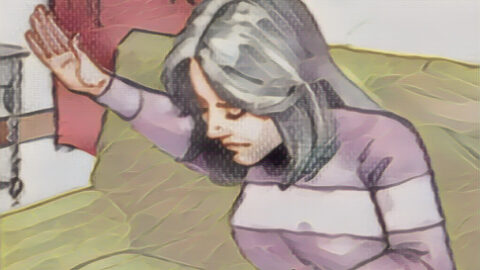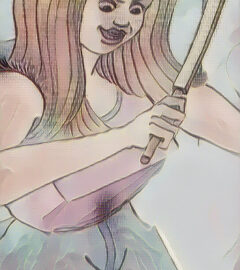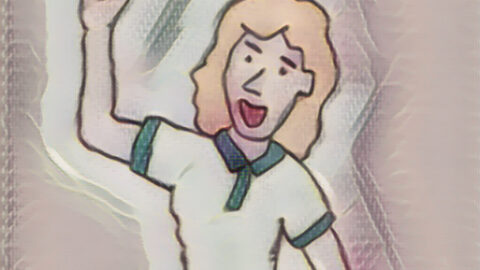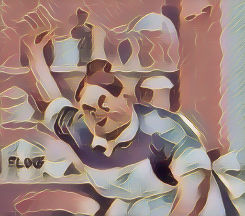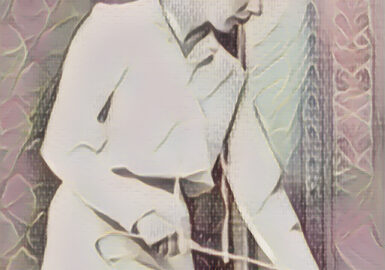(gap: 2s) I entered the world in 1970, yet in temperament, I was very much a child of the 1950s—at least, this was my mother’s frequent observation, often accompanied by a gentle shake of her head at my most recent misadventure. Our home in Bolton was a haven of patterned wallpaper, decorative plates, and the charming disorder that only a household with children can truly possess. Our family consisted of four: myself, my mother and father, and my elder sister, Sarah, who fancied herself a blend of matronly authority and amateur detective.
(short pause) In those years, the household slipper was considered as integral to a young person’s upbringing as arithmetic or the customary serving of boiled cabbage. At school, its threat hovered over us like a persistent cloud, and the mere mention of “the slipper” was sufficient to restore order to even the most unruly playground. Sarah, having endured the era of the formidable strap, recounted her experiences with a certain pride, sharing tales that never failed to make my hair stand on end.
(pause) At home, discipline was administered with a touch of creativity. Mother’s discerning gaze could halt even the most determined child, and Father’s raised eyebrow was a silent admonition that often persuaded me to reconsider any plans involving mud, frogs, or the neighbour’s washing line. On occasion, a gentle slap or, in Sarah’s case, a dramatic episode involving a glass of sherry and a well-aimed slipper, would occur. Yet, affection always followed—most often in the form of a freshly baked biscuit.
(short pause) My most vivid recollection, however, is the celebrated Slipper Incident. Sarah had returned from polytechnic, filled with new ideas and an air of sophistication. Mother and Father, seizing the opportunity for a rare evening together, entrusted us to one another’s care, with Sarah in charge and myself under strict instructions to “behave properly.” Naturally, this presented a certain temptation for mischief.
(pause) That Friday evening, we reclined in the living room, the soft glow of the television casting gentle shadows. We watched an old film—one featuring gentlemen in hats and distinguished moustaches—when, quite unexpectedly, a scene appeared: a stern gentleman administering a brisk reprimand to a lady in a frilled dress. My eyes widened, my cheeks flushed, and I endeavoured to appear unconcerned, which, of course, only made me appear more conspicuous.
(short pause) Sarah, ever alert to opportunity, switched off the television with a flourish. “Well, Helen,” she announced, “perhaps that is precisely what you require to complete your homework!” Her tone was that of a matron, though her eyes sparkled with amusement.
(pause) Earlier, we had engaged in a minor disagreement regarding my homework—Sarah advocating for algebra, while I preferred the noble pursuit of constructing paper aeroplanes. Now, confronted with her suggestion, I stammered, “No, truly, I am quite all right!” But Sarah was resolute. “Up you get!” she commanded, and, to my lasting embarrassment, I complied.
(short pause) In retrospect, I realise I might have fled to the garden or concealed myself behind the sofa, but curiosity (and perhaps a measure of sibling loyalty) prevailed. Sarah seated herself, patted her lap, and gave me a look that brooked no dissent.
(pause) She beckoned, and I approached, feeling rather like one facing a solemn fate. My mind raced—should I plead, should I escape, or should I simply faint and hope for the best? Before I could decide, Sarah had me across her knees, my school skirt gathered, and my dignity in disarray. The living room seemed to contract, the ticking of the clock grew thunderous, and the air was thick with anticipation. I could sense the warmth of her lap, the texture of her skirt, and the cold apprehension rising within me.
(short pause) “This will pain me more than it pains you,” she intoned, a sentiment I found most improbable. The first spank landed with a sound as sharp as a gunshot—startling, echoing, and utterly astonishing. A jolt of discomfort coursed through me, hot and stinging, and I emitted a cry that would have impressed even the most dramatic of heroines. My face burned with embarrassment, and my eyes filled with tears I was determined not to shed. Sarah, evidently relishing her newfound authority, delivered several more, each accompanied by a lecture on punctuality, neat handwriting, and the dangers of concealing frogs in the bread bin. Each reprimand seemed to last an eternity, the sting fading only to be replaced by the next. I could hear the sound of her hand, the rustle of my skirt, and my own breath coming in short, mortified gasps.
(pause) I cried out, wriggled, and made promises I had no intention of keeping. At one point, I attempted to shield myself with a cushion, but Sarah, ever resourceful, simply removed it and placed it upon her head like a judge’s wig, pronouncing me “guilty of the highest degree of naughtiness.” The absurdity of the moment nearly made me laugh, but the discomfort kept me firmly in the present. My legs kicked, my hands flailed, and I felt every bit the wayward child I was accused of being. The humiliation was as acute as the pain, and yet, beneath it all, there was a curious sense of security—Sarah’s hold was firm but never unkind, her scolding more theatrical than truly severe.
(short pause) Just as I was preparing to feign a dramatic faint, the door opened suddenly—and in entered our neighbour, Mrs. Pringle, bearing a tray of scones and an expression of utter astonishment. For a moment, time seemed to stand still. Sarah froze, I tumbled from her lap, and Mrs. Pringle, after a pause worthy of the stage, declared, “Well, I never! Is this a new form of charades?”
(pause) Sarah, her cheeks aflame, murmured something about “educational discipline,” while I, eager to preserve my dignity, announced that we were rehearsing for the school play. Mrs. Pringle, never one to miss an opportunity for conversation, nodded sagely and placed the scones on the table, promising to inform the vicar of our “theatrical ambitions.”
(short pause) The moment the door closed, Sarah and I dissolved into helpless laughter, the discomfort of the slipper forgotten in the amusement of our predicament. My pride was somewhat restored by the thought that, at the very least, I had brightened Mrs. Pringle’s day.
(pause) We never spoke of the Slipper Incident again—at least, not until many years later, when, fortified by sherry, Sarah would declare, “You always did possess a flair for the dramatic, Helen!” And I would reply, “Only when scones are involved.”
(short pause) Childhood, I have discovered, is a tapestry of such moments—equal parts mischief, mortification, and laughter. And if one is fortunate, a neighbour bearing a tray of scones will always arrive at precisely the right moment.

























